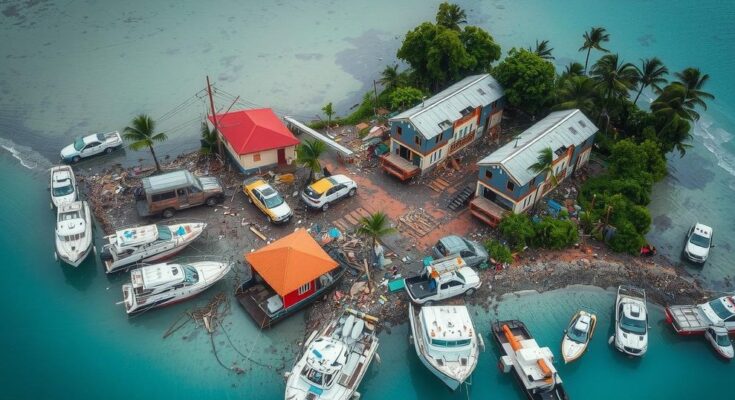Cyclone Chido has struck Mayotte, killing an estimated several hundred to possibly a thousand people. The peak wind speed reached 226 km/h, resulting in massive destruction, particularly in impoverished areas. Officials face challenges in accurately reporting deaths due to urgent burial customs. This cyclone has reignited conversations about immigration as many in Mayotte seek refuge from Comoros.
Authorities in the Indian Ocean territory of Mayotte are grappling with the aftermath of Cyclone Chido, which has been declared the most catastrophic cyclone to strike the area in over nine decades. According to François-Xavier Bieuville, the prefect of Mayotte, while the official death count rests at 14, he anticipates this figure may escalate to several hundred or even up to a few thousand fatalities as the search for survivors continues. The cyclone’s landfall brought with it winds reaching 226 km/h (140 mph) and exceptionally high storm surges that devastated many communities, particularly in the impoverished shantytowns of the island. As rescue crews arrive from both metropolitan France and the nearby territory of Reunion, local officials face significant challenges, especially given the cultural imperative for prompt burials within 24 hours that may hinder a comprehensive assessment of the casualties involved. Additionally, this disaster has resurfaced discussions surrounding immigration, as Mayotte, positioned as a gateway for many seeking asylum from Comoros, remains embroiled in contentious debates regarding citizenship rights.
The recent calamity has caused widespread destruction, impacting more than 321,000 residents who largely rely on informal housing. Authorities are in urgent need of accurately determining the death toll, a task complicated by local customs prioritizing expedient burial practices. The combination of the cyclone’s overwhelming force and the societal implications surrounding the response strategies highlights both the immediate and longer-term challenges that Mayotte faces moving forward.
Mayotte, situated in the Indian Ocean near the southeastern coast of Africa, is one of France’s most impoverished territories, where economic hardships have long persisted. This region has been plagued by socio-political issues, particularly concerning immigration, as it has become a destination for many asylum seekers from the neighboring Comoros Islands. The recent cyclone event is particularly significant, as it marks a threshold of potential morbidity and mortality not seen in the territory for nearly a century, showcasing the region’s vulnerability to extreme weather events exacerbated by climate change.
In summary, Cyclone Chido has wrought unparalleled devastation on Mayotte, leading to a potentially catastrophic death toll far exceeding current estimates. This disaster not only underscores the fragility of infrastructure in one of France’s poorest regions but also highlights the ongoing immigration challenges that have long plagued the island. As search and rescue efforts continue, the focus remains on addressing the humanitarian needs of the impacted population while navigating the implications of this crisis on broader societal dynamics.
Original Source: www.forbes.com




